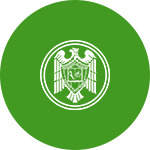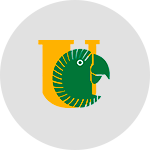Philosophical Framework
The social responsibility of the University of Colima is expressed in its mission, vision and university values, formulated on the basis of the Organic Law and the reflexive and critical recognition of its history. The man and his knowledge, the science and its development, those are basis of the scientific and technological progress.
| The University, as an educational institution, provides a privileged space where to stimulate the creative and scientific discussion reasoning as the motor for development of the society, since it transforms the human being into an active subject who aspires to the humanization. |
| From this perspective, the University is the physical and intellectual space for the development of the scientific culture by means of the professionalization of people in different fields of knowledge as well as technical and vocational training. |
| Its theoretical frame is established by the humanities, the economic and administrative sciences and the updated methodological support. |
| The University of Colima is an organization at the service of the society, providing theoretical, technical and conceptual tools that favor the production of new knowledge. |
| In this way, the University of Colima constitutes the point of convergence amid science, technology and the values for the search of critical truth and the constant evolution of the human being in the universe. |
Mission
The University of Colima as a social, public and autonomous body has as its mission: to contribute to the social transformation by means of comprehensive training of high school students, professionals, scientists and excellence builders; the decisive impetus to the creation, implementation, preservation and dissemination of scientific knowledge; the technological development and the manifestations of art and culture, within a framework of institutional transparency and timely accountability.
Vision
The University of Colima in 2030 is a socially responsible Institution, recognized in the world for its quality and relevance; Furthermore, for its systemic and creative contribution to egalitarian, democratic and sustainable development, and is distinguished by:
|
The training aimed to the comprehensive development of creative citizens, who become highly competent in their labor area; socially caring and committed; trained with educational programs of quality from a humanist, flexible, innovative and learning-centered perspective.
|
|
The recognition of the quality of its scientific research programs –basic and applied–as a result of its contributions to the knowledge; the development of the state and the country and the creation of a scientific and technological culture locally relevant.
|
|
The success of its relationships of academic and cultural cooperation with national and foreign individuals, institutions and organizations, based on the reciprocity and flexible structures.
|
|
Leading the critical analysis of the society to contribute to the sustainable development; to meet and anticipate the needs of the environment, transferring art, science, technology and innovation by a scheme of co-responsibility and social commitment.
|
|
To support its governability in a light, transparent, flexible management system with certified processes, making of its autonomy a responsible exercise.
|
Values
In order to put into effect the mission and achieve the vision of the institution, the decisions will be oriented and actions will be guided by the values and principles that give meaning to the institutional life:
| |
Liberty |
As an essential and distinctive human faculty that allows the university community members to define and lead their own destiny. |
|
| |
Equality |
As recognition of the essential community, in the human condition of the people, and the readiness to overcome the circumstances that would negatively affect the equitable access to opportunities. |
|
| |
Critical thinking |
As a capacity to rationally judge reality, with the conviction that there is always an open possibility for enrichment and rectification of ideas and values socially accepted. |
|
| |
Spirit of cooperation |
As the participation of the university community in joint and organized actions towards a common benefit. |
|
| |
Spirit of humanism |
That promotes the exercise of freedom of the university community members in favor of self-improvement. |
|
| |
Spirit of democracy |
Expressed in recognition and consideration of the points of view of the university community when discussing important issues for the institutional and social life. |
|
| |
Tolerance |
As acceptance of the diversity of the human being and the interest in developing their autonomy, as well as the disposition to enrich their own point of view from the understanding of others. |
|
| |
Responsibility |
As acceptance of the consequences that follow the actions freely performed. |
|
| |
Respect |
By which the members of the university community recognize in every human being a fundamental value, independent of their individual merit and social status; consequently, each person is considered as a purpose and never as a mean. |
|
| |
Honesty |
Expressed by the sincerity of behavior and affections, in the efficient fulfillment of compromises and obligations without traps, deceptions or delays; taking special care of the economic and material goods. |
|
| |
Ethics |
Present in the interest for the fulfillment of values, the acquisition of virtues and the adherence to the rational, justifiable and objective codes of conduct. |
|
University Government
The Government of the University of Colima, as stated in the article 8 of the Organic Law, is entrusted to:
 |
University Council |
This is the highest collegiate body of government and authority of the University of Colima, pursuant to the Organic Law of our institution. (Art 8, Organic Law)
|
university-goverment/consejo-universitario.htm |
 |
Rector |
This is the highest academic authority at the University; an Ex-officio member and legal representative of our institution. (Art 26, Organic Law)
|
rector/en/ |
|

|
University Officials |
This is the University staff in which the Rector has expressly placed confidence, to fill an executive position, with the powers and duties inherent to their position.
|
university-goverment/funcionarios.htm |
 |
Technical Board |
This is the highest authority at the schools of the University of Colima. They are part of the University Government structure. It is composed by one representative of teachers and one representative of students per class of each career offered at the different schools. They are elected under the terms established in the respective Regulations. (Art 32, Organic Law) |
university-goverment/consejos-tecnicos.htm |
UCOL Identity
Know the identity of the University of Colima, wearing a shirt with the university coat of arms, singing the University Hymn or attending a parrot football game.
 |
Coat of arms |
Learn about the origin of our coat of arms and how it has evolved through the time.
|
escudo.htm |
 |
University Anthem |
Know our anthem.
|
himno.htm |
|

|
About our mascot |
Learn about the origin of the university mascot.
|
mascota.htm |